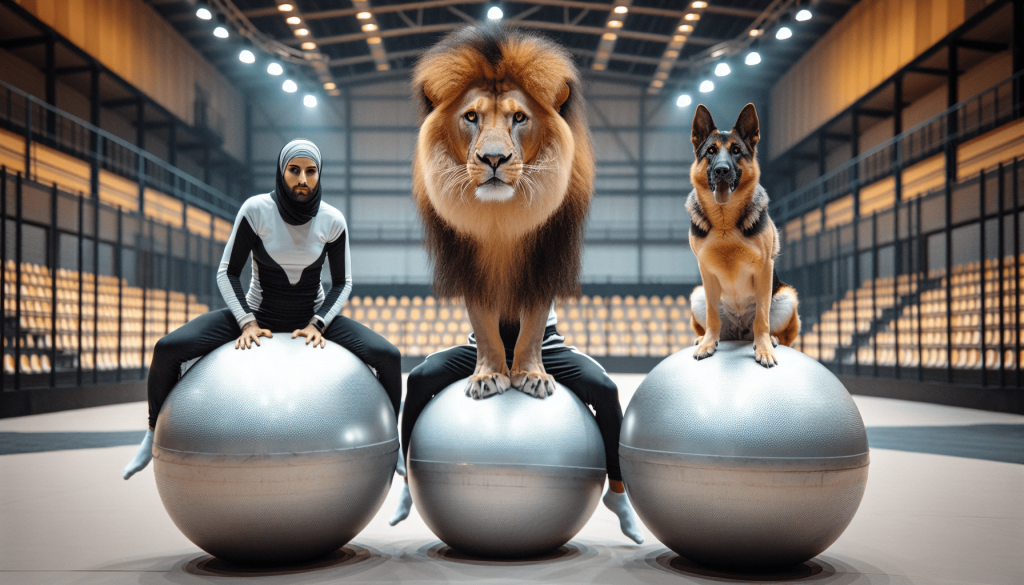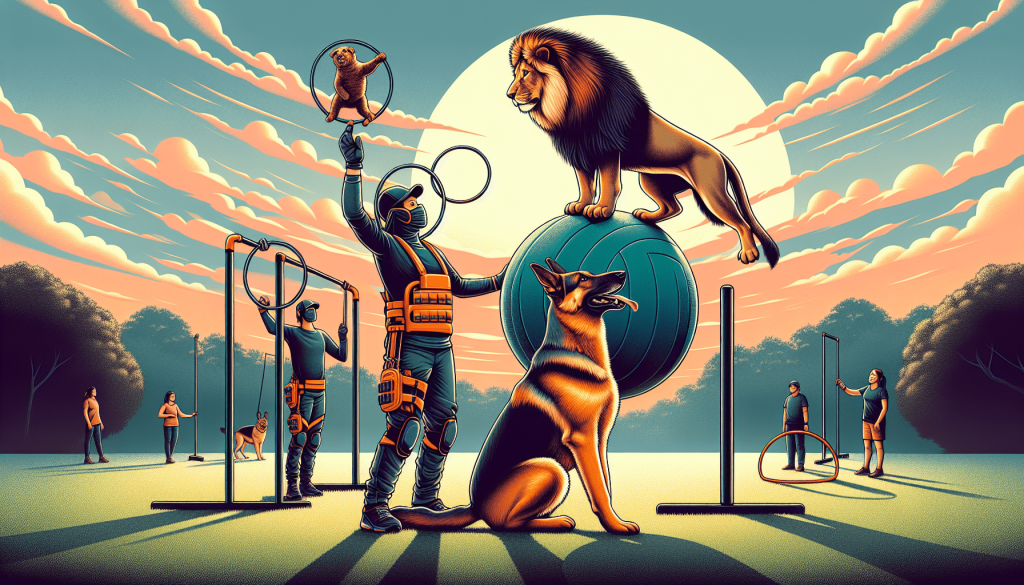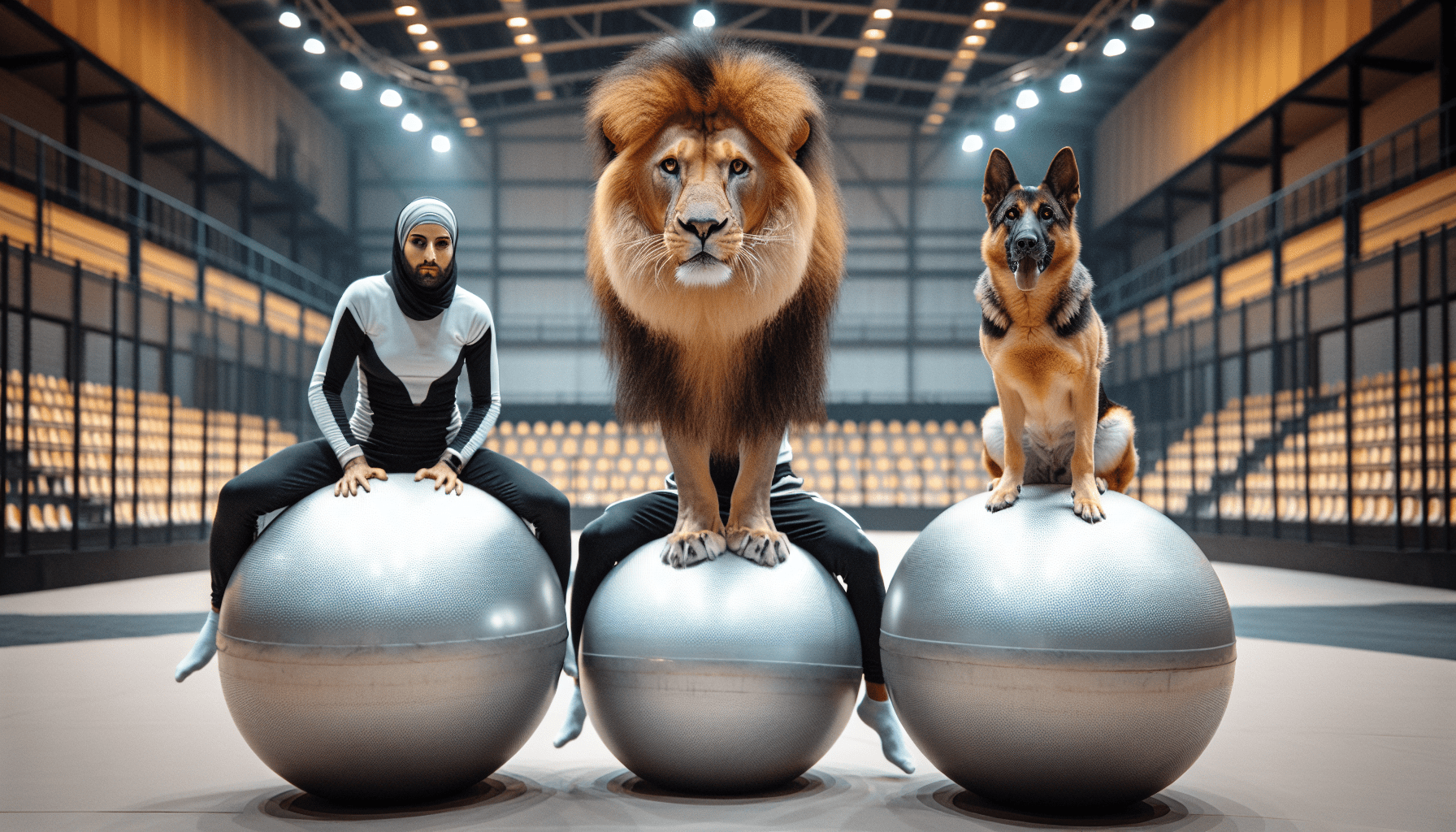Imagine witnessing a majestic lion perform an array of tricks just like a playful dog. It may seem too good to be true, but have you ever pondered the possibility of teaching lions remarkable tricks? In this intriguing article, we explore the fascinating question of whether lions possess the intelligence and agility required to learn and perform tricks similar to their domesticated counterparts, dogs. We delve into the unique characteristics of these magnificent creatures and delve into the potential challenges that come with training lions. Get ready to embark on a captivating journey as we unlock the truths behind the captivating world of lion training.
Physical Abilities
Strength and Size
Lions are renowned for their incredible strength and imposing size. As the second largest big cat species, they possess an awe-inspiring muscular physique, making them capable of overpowering large prey. With their powerful forelimbs and sharp claws, they are adept at taking down formidable prey such as wildebeests and buffaloes. A fully grown male lion can reach a massive size of around 550 pounds, while females are slightly smaller. This remarkable strength and size set the foundation for understanding the potential for trick training in lions.
Speed and Agility
Lions may not match the cheetah’s incredible speed, but they are still quite impressive runners. Capable of reaching speeds up to 50 miles per hour in short bursts, they possess a surprising agility that is essential for survival in the wild. Their nimble movements allow them to chase down prey and navigate through challenging terrain. Although not as renowned for their agility as smaller feline species, lions still possess the physical attributes necessary to perform certain tricks and exhibit precise movements when trained appropriately.
Intelligence and Trainability
Comparison to Dogs
Dogs have long been regarded as intelligent and easily trainable animals, often performing an array of remarkable tricks. However, this does not mean that other species, such as lions, lack intelligence or the capacity to be trained. Lions, like dogs, possess cognitive abilities that can be harnessed to learn and execute specific commands or tricks.
While it is essential to understand that lions and dogs have evolved in different environments and possess different instincts, it does not diminish the potential for lions to learn tricks. In fact, their natural intelligence and trainability can be explored and utilized to provide mental stimulation and enrichment, both in captivity and during conservation efforts.
Cognitive Abilities
Lions exhibit remarkable cognitive abilities that contribute to their survival in the wild. From problem-solving to social interactions, they rely on their mental prowess to navigate complex situations. Lions have a well-developed memory, enabling them to remember important hunting techniques and vital information about their territory and social group.
This cognitive capacity provides a foundation for their trainability. By capitalizing on their ability to associate specific stimuli and outcomes, lions can be taught to perform basic commands or tricks. Through positive reinforcement training techniques, such as using rewards and praise, lions can learn to respond to cues and engage in purposeful behaviors.

Behavior Patterns
Instincts
Lions’ behavior is heavily influenced by their natural instincts, which have been ingrained through generations of evolution. Their predatory instincts are especially prominent, driving them to hunt, defend territory, and establish social hierarchies. As carnivores, their primary focus is on ensuring their survival and that of their pride.
These inherent instincts may create challenges when it comes to trick training. The trainers must be mindful of not triggering behaviors that could interfere with the lion’s well-being or the safety of those involved. Recognizing and respecting these instincts is crucial when incorporating tricks into the training process.
Social Structure
One of the defining characteristics of lions is their complex social structure. They live in prides, which consist of several related females, their dependent cubs, and a coalition of male lions. This social organization plays a vital role in their behavior patterns, hunting strategies, and overall well-being.
Understanding the social dynamics among lions is essential for initiating any training program. By recognizing the importance of pride dynamics and maintaining a positive and respectful training environment, trainers can work within the natural social structure of lions to teach them tricks and commands.
Potential Tricks Lions Can Learn
Basic Commands
Lions can be taught basic commands, similar to what dogs learn. With their intelligence and ability to form associations, they can recognize and respond to cues like “sit,” “stay,” and “lie down.” These commands can be taught through positive reinforcement techniques such as clicker training or using treats as rewards.
While it’s important to note that the specific tricks a lion can learn may differ from those commonly performed by dogs due to their differing anatomies and innate behaviors, basic commands serve as building blocks for more complex training.
Trick Training
Beyond basic commands, lions can potentially learn a variety of tricks that showcase their natural abilities and appeal to their instincts. It is crucial to tailor tricks to align with their natural behaviors, ensuring that they feel comfortable and motivated to participate in the training process.
For example, a lion’s impressive roar can be incorporated into a trick where they vocalize on command. Similarly, their exceptional speed and agility can be showcased through retrieving objects or navigating through obstacle courses. By designing tricks that tap into these innate abilities, trainers can create an enriching and mentally stimulating experience for the animal.

Implications and Risks
Safety Concerns
When considering training lions or any wild animal, safety concerns must be a top priority. Lions, even when raised in captivity or under human care, still possess their natural instincts, including their impressive strength and predatory behaviors. It is crucial to ensure a safe working environment for both the trainers and the animals involved in the training process.
Trainers must have comprehensive knowledge and experience in working with large cats to minimize the risks associated with training lions. Strict safety protocols and appropriate training techniques should always be implemented to prevent accidents or injuries.
Ethical Considerations
Ethical considerations are paramount when it comes to training wild animals like lions. It is essential to strike a balance between providing mental stimulation and enrichment for the animal while ensuring their well-being and natural behaviors are respected.
Trainers should prioritize positive reinforcement techniques and avoid any form of punishment or coercion during training sessions. Additionally, continuous monitoring of the animal’s physical and mental health helps maintain ethical standards, ensuring that the lion’s welfare is always the primary focus.
Legal Restrictions
Wild Animal Regulations
Due to the inherent risks and complexities associated with owning and training wild animals, legal restrictions are in place in many regions. These regulations aim to safeguard both the well-being of the animals and public safety. Obtaining the necessary permits, licenses, and adhering to strict guidelines is essential for anyone involved in the training and ownership of lions and other exotic animals.
By complying with these regulations, individuals can help ensure that lion training is carried out within the framework of legal and ethical standards.
Ownership and Training Laws
In addition to wild animal regulations, laws pertaining to ownership and training of lions may differ across jurisdictions. Some countries may prohibit private ownership of lions or require specific permits for training purposes. It is crucial for trainers and aspiring lion owners to research and understand the legal requirements within their respective regions to avoid potential legal repercussions.
By adhering to ownership and training laws, individuals can contribute to responsible lion training practices and support the overall welfare of these magnificent creatures.
Conservation and Education
Role of Zoos and Sanctuaries
Zoos and sanctuaries play a crucial role in lion conservation and education. Through comprehensive care and preservation efforts, these institutions provide a suitable environment for lions while promoting research and public awareness about the species.
Lion training can be incorporated as an educational tool within these facilities. By showcasing the natural behaviors, physical abilities, and intelligence of lions, trainers can engage visitors and enhance their understanding and appreciation of these magnificent animals.
Educational Programs
Educational programs focused on lion training can serve as a powerful tool to raise awareness and promote conservation efforts. Programs that highlight the positive aspects of training, such as mental stimulation and enrichment, can help dispel misconceptions and strengthen public support for lion conservation.
Through interactive workshops, presentations, or even virtual experiences, educational institutions and conservation organizations can educate individuals about lion behavior, their role in ecosystems, and the importance of protecting their natural habitats.
Alternative Perspectives
Promoting Wild Behavior
While lion training offers opportunities for mental stimulation and enrichment, some argue that it may compromise the wild behavior and natural instincts of these majestic animals. This perspective emphasizes the importance of allowing lions to exhibit their innate behaviors without interference or training.
Advocates for promoting wild behavior argue that developing more extensive conservation efforts that focus on habitat preservation and addressing human-wildlife conflicts would be more beneficial in the long run. By respecting and protecting their natural abilities, lions can thrive in their natural habitat.
Respecting Natural Abilities
Respecting the natural abilities of lions is a perspective that aligns with the notion that animals should not be forced or coerced into performing tricks that exploit or compromise their well-being. This perspective emphasizes providing lions with environments that allow them to engage in species-specific behaviors and exhibit their natural abilities.
While training for mental stimulation and enrichment is essential, respecting the boundaries of what lions can naturally accomplish ensures their welfare is prioritized, while still enabling humans to observe and appreciate their majestic nature.
Conclusion
In conclusion, while lions may not possess the same innate behaviors as domesticated dogs, they still exhibit intelligence, trainability, and the potential to learn tricks. By understanding their physical abilities, cognitive capacities, and natural behavior patterns, the training of lions can be approached with care, respect, and adherence to legal and ethical considerations. Whether used as an educational tool, a form of enrichment in captivity, or carefully incorporated into conservation efforts, lion training can provide unique insights and promote appreciation for these magnificent creatures. Ultimately, the responsibility lies with trainers, owners, and society at large to ensure that lion training is conducted responsibly and with a focus on the welfare and preservation of these iconic animals.

